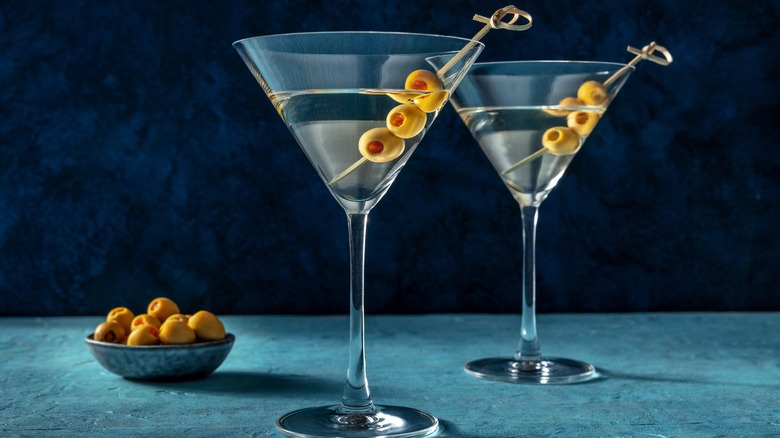The Controversial Opinion Alton Brown Has About Martinis
If you cook a lot, you've likely come across a recipe or two from a celebrity chef that delivers a terrible dish, making you question whether anyone even tested the recipe before publishing it. The internet is full of such recipes leading to wasted time and money, but no one could accuse Alton Brown of such blasphemy.
The Food Network personality and longtime host of "Good Eats" and several cooking competitions has developed a reputation for using science to back up his recipes, even winning the prestigious Peabody Award (the Pulitzer Prize for television) in 2006. Called a 'food expert' by Food Network, Brown educates home cooks on foods eaten often but rarely prepared at home.
The outspoken cook, who prefers not to be called a chef, per the AV Club, publicly shares his opinion on everything including Will Smith's infamous slap at the Oscars, the best butter to use for baking, and how a martini should be prepared. Speaking of martinis, which are referred to as "the only American invention as perfect as the sonnet" by controversial American journalist H.L. Mencken, Brown's opinion on this cocktail may shock you.
A martini can be served straight up, on the rocks, in and out of a martini glass, and with a dozen garnishes, including bleu cheese. This drink can be intimidating to order! But forget 007's "shaken not stirred" demands or the Pornstar Martinis that recently got Brits into trouble and try Brown's suggestion for a classic, elegant martini instead.
Brown's ideal martini
While the United States Bartenders' Guild states a martini is made with gin and dry vermouth, the decade you ordered a martini could determine its ingredients. Created around 1860 in San Francisco, California, some believe the first martini was made with Old Tom gin, vermouth, bitters, and a Maraschino cherry, resulting in a sweeter, pink version of the martini. The first record of the modern-day martini, gin, dry vermouth, and a dash of bitters served with a lemon peel or olive wasn't until 1911 in New York (per Frankie Bones).
According to Food Network, Brown's perfect martini precisely combines "60 milliliters of gin, 20 milliliters of vermouth, and 10 milliliters of olive brine" and is served with exactly three olives. He stresses the gin must be icy-cold and recommends storing the bottle in the freezer. Using a three-step process, Brown makes his martinis in a beaker, as it lowers the melting point of the ice. He swishes the cubes with gin before dumping it all out and placing the pitcher in the freezer to create a thin layer of ice throughout the beaker.
Although vodka martinis are referenced in 1952 and became popular during the 90s (per USBG), Brown denounces the variation stating a martini made with vodka is not a martini (per POPSUGAR.). Brown's version is "a little bit dirty" and contains tiny ice crystals floating on top due to his scientific technique, resulting in a gin martini Brown calls 'positively delightful."

